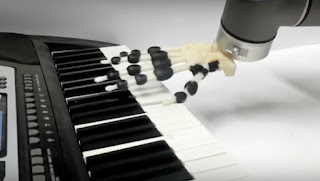Robot Piano Player
Robotic Hand with Rhythm
Piano: Very Challenging & Complex Test for Robotic Passive Movement Systems
Engineers at the University of Cambridge in the UK have developed a robotic hand that can play the piano by just moving its wrist. This is a passive movement robotic system. The fingers don't move independently. Because of the complexity of playing the piano, the roboticists believe it was the ideal test for their new innovation system.
PianoHand
The hand is 3D printed. It replicates all the bones and joints in a human hand. It doesn't include replications of the tendons and muscles. Because the fingers don't move independently of the wrist (passive movement), the robot is able to achieve different styles of piano playing without changing the material or mechanical properties of the hand. That's important new robotics.
More Natural Moving Robots
Experts believe this passive movement concept may lead to the design of more natural moving robots with minimal energy use. The results were just published in the journal Science Robotics. The robot plays simple musical passages in different piano playing styles. It's robotic innovation that underscores several important points. How difficult it is to replicate all of the capabilities of the human hand. And how much complex movement can be innovated by roboticists. For more news stories on robotic and other innovations go to my journalist colleague Ed Kane at amazon.com/author/ekane
 |
| Source: University of Cambridge |
Piano: Very Challenging & Complex Test for Robotic Passive Movement Systems
Engineers at the University of Cambridge in the UK have developed a robotic hand that can play the piano by just moving its wrist. This is a passive movement robotic system. The fingers don't move independently. Because of the complexity of playing the piano, the roboticists believe it was the ideal test for their new innovation system.
PianoHand
The hand is 3D printed. It replicates all the bones and joints in a human hand. It doesn't include replications of the tendons and muscles. Because the fingers don't move independently of the wrist (passive movement), the robot is able to achieve different styles of piano playing without changing the material or mechanical properties of the hand. That's important new robotics.
More Natural Moving Robots
Experts believe this passive movement concept may lead to the design of more natural moving robots with minimal energy use. The results were just published in the journal Science Robotics. The robot plays simple musical passages in different piano playing styles. It's robotic innovation that underscores several important points. How difficult it is to replicate all of the capabilities of the human hand. And how much complex movement can be innovated by roboticists. For more news stories on robotic and other innovations go to my journalist colleague Ed Kane at amazon.com/author/ekane
%20(1)%20(1)%20(3)%20(2)%20(2).jpg)


Comments
Post a Comment